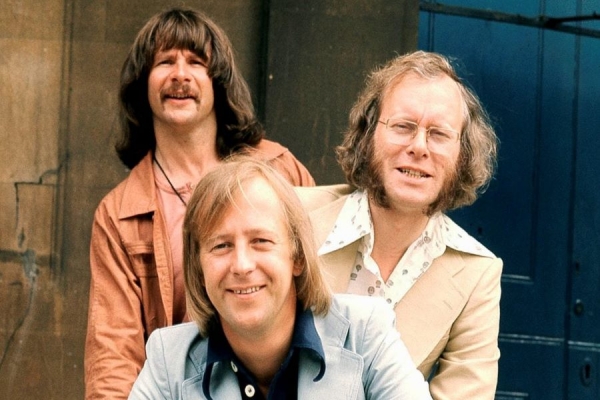The Goodies on ZANI
Written by Matteo SedazzariOn the evening of 8th November 1970, BBC 2, three maverick characters were unleashed to the British viewing public, The Goodies.
Tim Brooke Taylor (17th July 1940 – 12th April 2020) posh and a Royalist, often donning a Union Jack waistcoat. Graeme Garden (18th February 1943) a bespectacled man with fuzzy chops and a scruffy professor's attire. Bill Oddie (7th July 1941), a cheerful and mischievous hippy in far-out clothes, comical parodies of themselves. When not out and about on their legendary Tandem bike, the trio resided in London, where they ran a consultancy with the motto, ‘Anything, Anywhere, Anytime.’ Echoing The Who’s carefree sixties Mod anthem, ‘Anyway, Anyhow, Anywhere.’ Like the four different personalities of The Who, Pete, Roger, John, and Keith, The Goodies, Tim, Graeme, and Bill, would often quarrel yet unite when they had to, just like The Who.
The Goodies certainly had echoes of Warner Bros’ Looney Tunes, silent slapstick comedy, The Beatles’ film Help, The Fab Four’s animated Yellow Submarine, and The Monkees’ TV series. A group of creative and crazy young men living together and getting involved in madcap adventures and confrontations with figures of authority and crime syndicates. The Beatles and Monkees’ skirmishes would entail a song by the respected band in a knockabout scenario. The Goodies used this principle to perfection. A good example is the opening credits, featuring all three in zany situations from the show with their iconic theme song. Throughout the show, whether Bill going mad in Gender Education (1971) or Graeme sword fighting with Bill and Ben the flowerpot men in The Goodies Rule – O.K.? (1975), music, all written by Bill, would feature to enhance the humour.
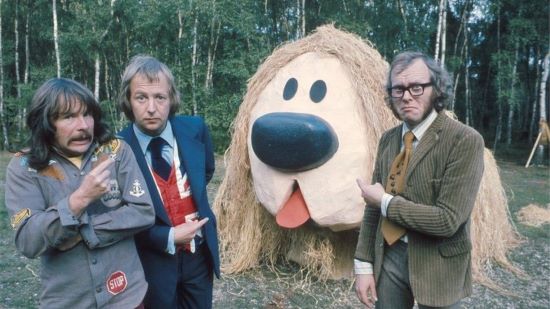
The theme song, which had three versions, demonstrates Bill, along with producer and songwriter Michael Gibbs (who went to work with Whitney Houston, Sister Sledge, and more), his talent and versatility. Version one and two of the theme song started as a soulful rock track, yet the theme song became funkier as the show evolved. In the mid-1970s, when The Goodies were at their peak, a more pop-style piece replaced the original theme tune. With the opening chorus, ‘G- You need a helping hand, O- You know we understand, O- We'll be there right to the end, Everyone needs a friend, Goody-goody-goody, D- You should definitely, Y- You should enquire and see, We, we take any old line, Anything, anytime, Hey hey hey.’ It would be fair to say that the final theme song is most associated with The Goodies.
Before becoming a household name in the 1970s, Bill Oddie had felt the wrath of censorship in the sixties. Bill, then in his early twenties, had recorded 'Nothing Better To Do.’ A song about the melees between Mods and Rockers on the coastal towns occurring during the Bank Holidays in the early swinging sixties. The BBC felt the mentioned subcultures might ‘adopt the song as their anthem when they went into battle!’; therefore, the song was banned. Then, after England’s victorious World Cup win in July 1966, Bill was in attendance and was going to release a song via Polydor in November of that year, entitled ‘The Nobby Stiles March.’ A homage to Nobby Stiles, the footballer, and his dance around Wembley after the game. However, Nobby Stiles, via his lawyers, prohibited the record from ever being played.
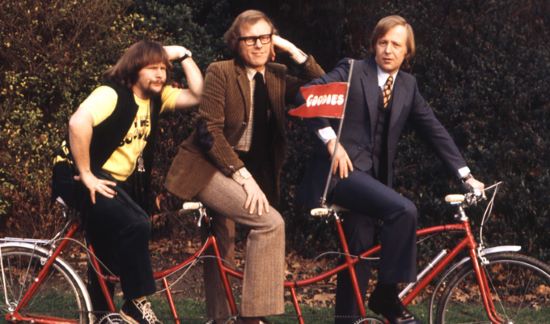
Yet The Goodies, then and now, are remembered for their novelty records. Their biggest hit, ‘The Funky Gibbon’, Spring 1975, was a light-hearted sing-along song loved by the fans, reaching number four in the hit parade. This was no mean feat in 1975. Furthermore, the three performing in matching dungarees on Top of the Pops has become a legendary performance from the show. One powerful feature of Funky Gibbon is the Clavinet. Many soul and funk musicians use the Clavinet like Stevie Wonder for his iconic song, ‘Superstition.’ However, the critics hated ‘Funky Gibbon’, one in particular, John Peel, in his review for the publication, Sounds, 26th April 1975, wrote ‘1973 vintage Goodies and quite dreadful’. Peel declared that, later on, the three Goodies beat him up at the Marquee in early May 1975 over the review. The Goodies have always denied this allegation. I love to think John Peel was telling the truth!
Despite The Goodies’ massive popularity with the general public in the 1970s, it didn’t seem that they were ever flavour of the month with their bosses, the BBC.
The trio was often called into the Director General’s office to be told off over content, like naughty schoolboys. There was an upsetting telegram from Mary Whitehouse, revering her disgust over Tim ridiculing John Travolta from Saturday Night Fever. When Tim put a carrot in his underpants in Saturday Night Grease (21st January 1980), to give the impression that he was well endowed. Yet this complaint delighted The Goodies, as Mary Whitehouse had been on their hit list since the early 1970s after receiving a letter from her complimenting the lads on their first series. So, The Goodies sent her up in Gender Education (31st December 1971) as Desiree Carthorse, played by comic legend Beryl Reid. Yet to The Goodies disappointment, not a word from Mary after the broadcast. The BBC blacklisted three songs by Bill for the show; due to their offensive lyrics, Sick-Man Blues, Blowing Off, and 'Father Christmas Do Not Touch Me.
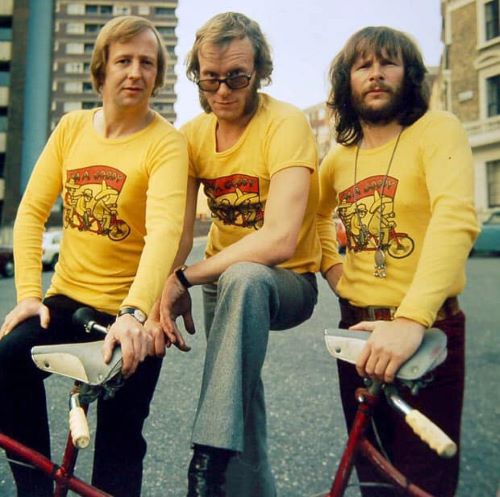
In early 1975, the BBC asked The Goodies to rewrite an episode about the then inhumane apartheid in South Africa, entitled ‘South Africa.’ The BBC management stated, ‘ We feel you are being a little bit harsh on the South African police.’ Later on, in 2005, Bill said he wondered if the BBC might have had shares in South Africa's goldmines at the time. Yet Tim, Graeme, and Bill managed to keep the sign for the South African Tourist Board, which read ‘Through Door and Turn White,’ highlighting the racism within the country then. To the best of my knowledge, The Goodies were the first artists in the UK to bring the apartheid in South Africa to people's attention.
The Goodies were the voice of the outsider, not afraid to speak their mind, challenge, and mock anything they wanted to. Yet Tim, Graeme, and Bill were far from bullies as the trio never ridiculed the weak. The Goodies taunted the oppressor, not the oppressed, comically. Like in Give Police a Chance (22nd November 1970), a satire about police brutality and corruption, undoubtedly brave and pioneering by the lads back then. A favourite target of The Goodies was The Royal Family, who Bill would later say, ‘regard Royals as curious figures of fun.’ Yet, neither three refused or returned their OBEs later on in their career. But back in the 1970s, they, along with Monty Python, The Goodies challenged the norm and pushed boundaries with madcap humour, music, and enlightenment.
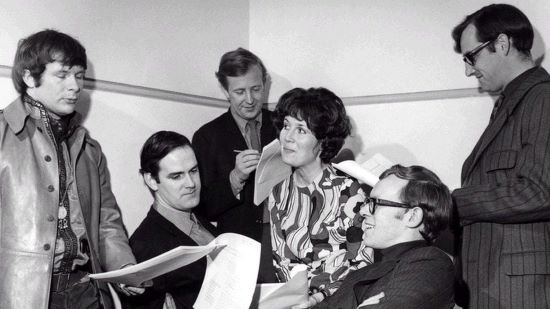
The Goodies and The Pythons paths would cross many times throughout the 1960s. Initially at Cambridge University Footlights Dramatic Club, when students Tim, Graeme, Bill, Graham Chapman, John Cleese, and Eric Idle met and worked together for the first time. Their revue, ‘Cambridge Circus,’ was picked up by BBC Radio. Renamed I'm Sorry, I'll Read That Again, piloted 30th December 1963, and the first series aired 3rd April 1964. I'm Sorry, I'll Read That Again became I'm Sorry I Haven't a Clue in 1972, which is still going strong today on Radio Four, with Tim appearing before his death and Graeme a regular.
After their radio debut, the Footlights, as we know, moved into television, with At Last the 1948 Show, Twice a Fortnight, How to Irritate People, and a few more. Tim and Graeme wrote and created Broaden Your Mind (28th October 1968). The first-ever colour BBC comedy series. Bill soon joined the cast, and future Monty Python Michael Palin and Terry Jones as cast regulars. The series only ran for 13 episodes, and sadly only ten minutes remain of this show.
However, The BBC saw the potential, camaraderie, and chemistry between Tim, Graeme, and Bill and offered them a show but never a formal contract, while Cleese and Co. were given a show and a formal contract. However, there seems to have never been any rivalry or jealousy between The Goodies and Monty Python, just respect and admiration.
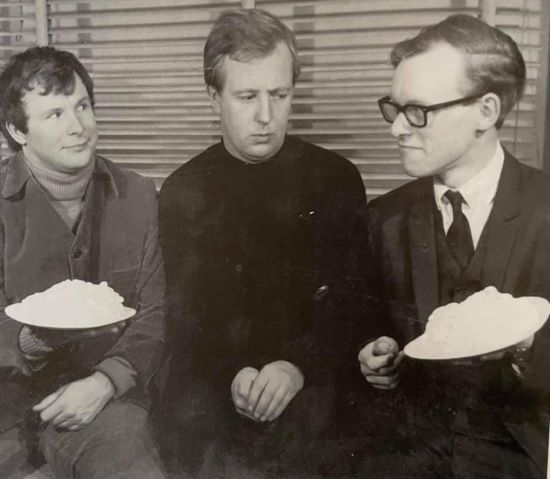
The Goodies aren’t forgotten, yet, unlike their friends, Monty Python, they aren’t celebrated by the BBC as much. The Goodies’ shows, which ran for eight series from 8th Nov 1970 to 18th February 1980 on the BBC, before the Goodies moved to ITV for one series, are seldom repeated on the BBC and never on UK Gold or such. Even when Tim Brooke Taylor, who brought so much to British comedy, passed away in April 2020, there were no significant tributes on the BBC.
The Goodies have consistently campaigned to be repeated. In an interview with Mail on Sunday, Graeme said ‘When fans have written in asking why they aren't repeating The Goodies, the BBC always reply saying they're looking forward and want to invest in new comedy. “So, I thought, 'Well, that means we won't be getting the p.m. Dad's Army slot then’
But there is good news all The Goodies episodes are available on DVD thanks to Network, and a handful of episodes are on BritBox
Yes, the sets wobbled, the special effects and clothes are dated. The humour on occasions may be juvenile, brutal, insulting, and of its time; to the point, it might offend some people. But compared to what is readily available today, from the Hangover franchise to The Inbetweeners, The Goodies are mild. Anyway, the BBC can always slap on a warning for inappropriate language and such. However, The Goodies never used their comedy to push a narrative of hate. Instead, they made a generation laugh, value their family and friends, live for the moment, and question authority; and there ain’t nothing wrong in that!.
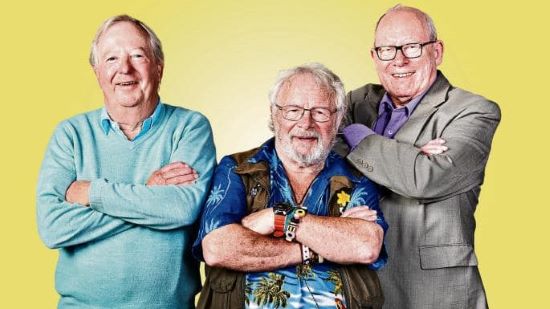
Matteo Sedazzari
Latest from Matteo Sedazzari



